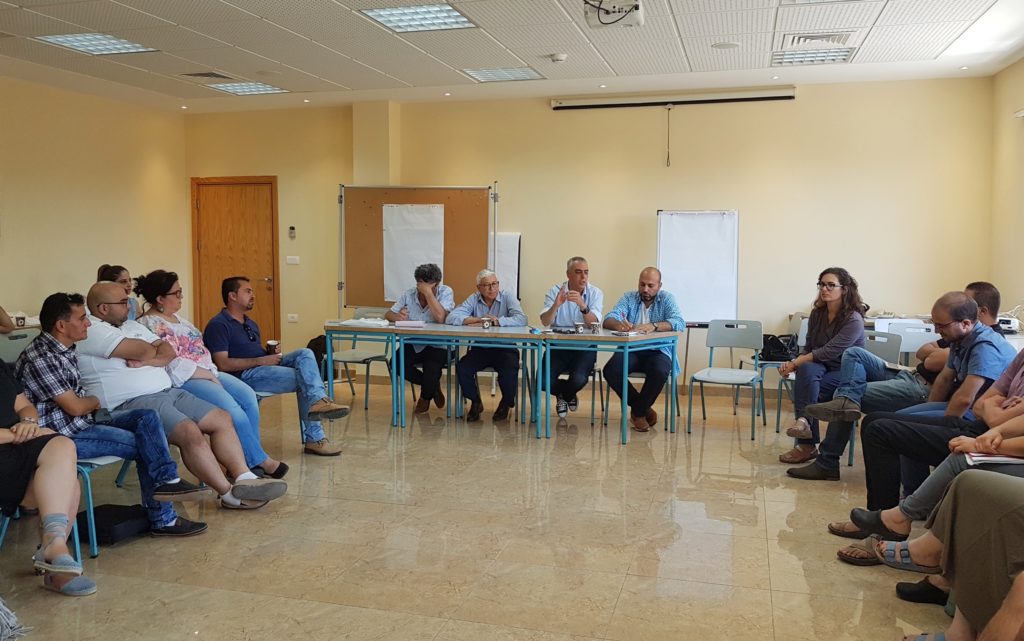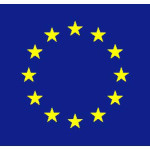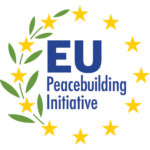Up & Coming Politicians Preparing for Negotiations
On Friday September 8, the second group from our Up & Coming Politicians course, which the School for Peace holds in cooperation with the Palestinian Center Inmaa, met in Beit Jala for a bi-national preparatory meeting. Throughout the meeting the participants prepared for the negotiations simulation which is supposed to take place in Aqabah next month.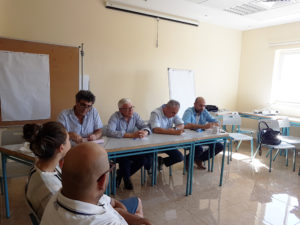
The meeting opened with an explanation about the negotiations simulation and the negotiation process. After the explanation, the participant listened a panel of lectures which included Dr. Radi Jara’i, former vice minister of prisoner’s affairs and secretary of the one-state solution campaign; Meiron Rapoport, one of the founders of the Two States, One Homeland movement; and advocate Muhammad Hadyeh, legal counsel of the Palestinian negotiations department, who spoke about the two-state solution and the Palestinian stance in the official negotiations. The panel raised a lot of questions and a fruitful discussion between the participants about the negotiation process.
After the panel, each national group met alone to discuss the election of the negotiation leaders. The result of the elections was the election of a Palestinian women in the role of the President of the Palestinian Authority, A Jewish-Israeli woman in the role of Prime Minister of Israel, and a Palestinian Citizen of Israel as the Head of the High Follow-Up Committee of the Arab Citizens in Israel. The participants expressed their wish to lead a different negotiation process than the one we see happening or not happening on the ground between the Israelis and Palestinians, with the hopes of reaching better results with their method. Accordingly, they decide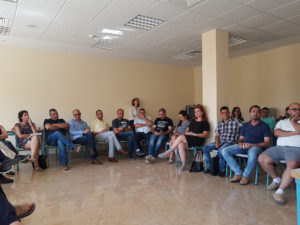 d that emphasis would be put on new voices and views that normally are not part of the negotiations with the hopes of offering a fresh perspective.
d that emphasis would be put on new voices and views that normally are not part of the negotiations with the hopes of offering a fresh perspective.
The main topics that were chosen and assigned to four committees included: Jerusalem, scenarios for a permanent solution, Security and Borders, and finally historical justice, and natural resources.
This project of Up & Coming Politicians is part of a three-year program started in 2016 by the School for Peace in cooperation with the Palestinian center Inmaa. Using the School for Peace’s unique dialogue method and their Change Agents model, the program aims at creating a new generation of Palestinian and Israeli politicians who have the tools and the will to negotiate a lasting peace between Israel and Palestine, and to improve and utilize their skills for creating broader, long term, positive change in their societies.
By analyzing the present Knesset leadership in Israel, and focusing on trends within the Palestinian Authority, the SFP identified individuals who we believe will be moving into political leadership in the next ten years. In Israel, for example, the SFP found that today’s political leaders emerged from student unions, immigrant groups, leaders in peripheral communities, the media, local governments and from those who have been involved in their political party structure from an early age. In Palestine, the political leadership is emerging from members of national executive committees of different political parties, student unions, NGOs, labour unions and municipal councils. 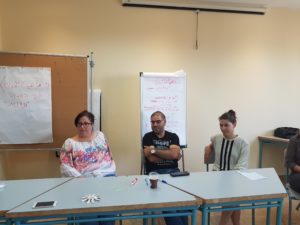
From these target groups, the School For Peace and Inmaa chose 120 participants who will take part in this special program over the course of three years. Each year a group of 40 Jewish-Israelis, Palestinian-Israelis, and Palestinians from Palestine, will enter the program to meet and work together for 18 months, at the end of which they will create a project together for improving their societies.
For this reason, the School for Peace was awarded a grant from the European Union Peacebuilding Initiative in order to implement this program and support the projects and initiatives created by the participants. The program which began in 2016 is slated to end in 2018.
This project is funded by the European Union.

